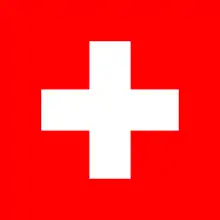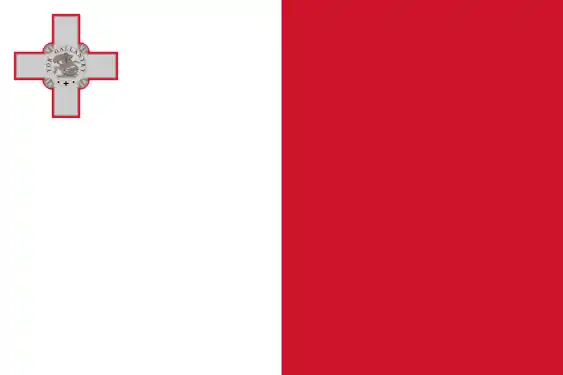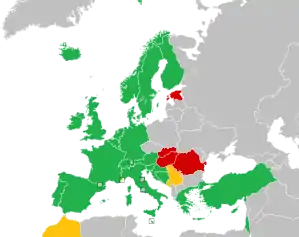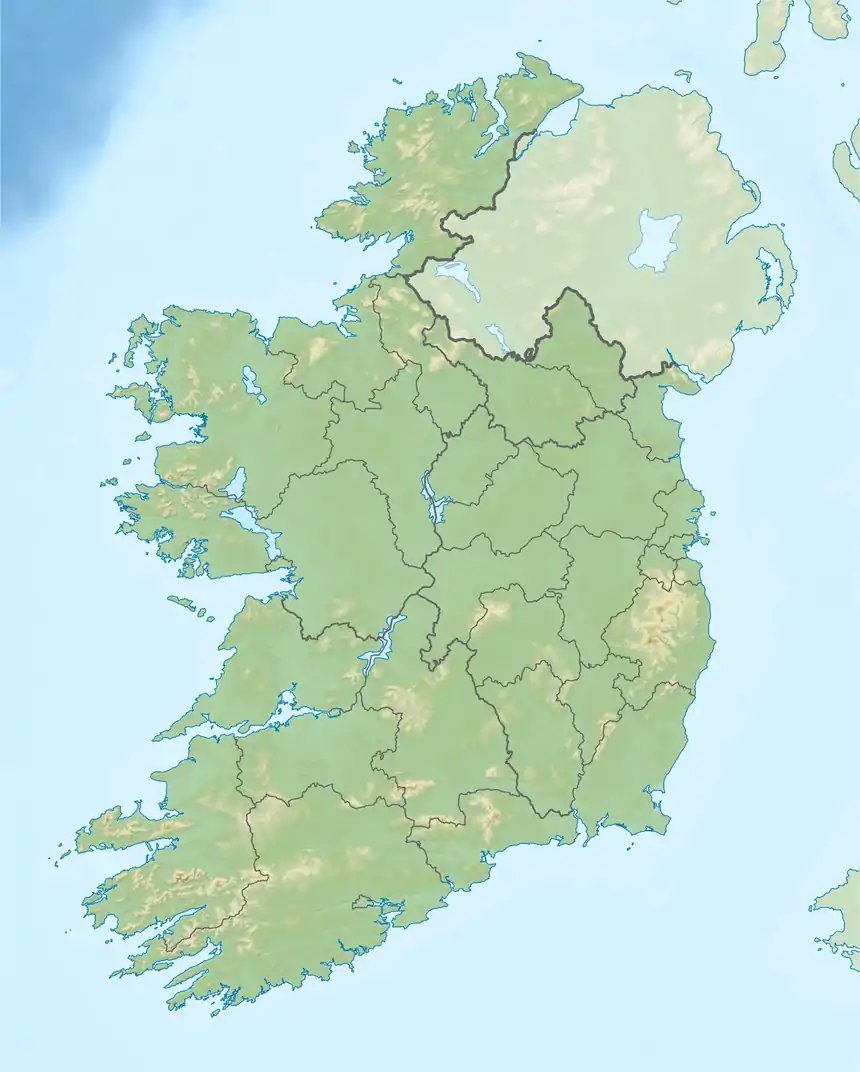Eurovision Song Contest 1993
The Eurovision Song Contest 1993 was the 38th Eurovision Song Contest and was held on 15 May 1993 at Green Glens Arena in Millstreet, County Cork, Ireland. The presenter was Fionnuala Sweeney. Niamh Kavanagh was the winner of this Eurovision for Ireland with the song, "In Your Eyes". This was Ireland's fifth victory, and equalled the tally of five Eurovision victories achieved by France in 1977 and Luxembourg in 1983. Ireland became the fourth country to win two years in a row, the three previous countries to do so were Spain in 1968 and 1969, Luxembourg in 1972 and 1973, and Israel in 1978 and 1979.
| Eurovision Song Contest 1993 | |
|---|---|
 | |
| Dates | |
| Grand final | 15 May 1993 |
| Host | |
| Venue | Green Glens Arena, Millstreet, County Cork, Ireland |
| Presenter(s) | Fionnuala Sweeney |
| Musical director | Noel Kelehan |
| Directed by | Anita Notaro |
| Executive supervisor | Christian Clausen |
| Executive producer | Liam Miller |
| Host broadcaster | Raidió Teilifís Éireann (RTÉ) |
| Opening act | The story of Eochaid and Étaín in Celtic mythology, transitioning into a video of rural Ireland today. |
| Interval act | "Why Me?", performed by Linda Martin "Voices", performed by Johnny Logan with the Children of Millstreet and the Cork School of Music Choirs. |
| Website | eurovision |
| Participants | |
| Number of entries | 25 |
| Debuting countries | |
| Returning countries | None |
| Non-returning countries | |
Participation map
| |
| Vote | |
| Voting system | Each country awarded 12, 10, 8–1 point(s) to their 10 favourite songs |
| Nul points | None |
| Winning song | "In Your Eyes" |
The top two countries of this contest were the same as the top two countries in the previous year's contest, being Ireland and the United Kingdom.
Location
The location for this year's edition of the contest was unique, in that Millstreet, with a population at the time of just 1,500 people, was the smallest host town ever chosen for the Eurovision Song Contest.
The owner of the Green Glens Arena, Noel C. Duggan, wrote to the RTÉ on the same night of the Irish victory in the 1992 edition, proposing the free use of the venue to host the contest. The venue, a large indoor well- equipped equestrian centre was deemed more than suitable as the location by host broadcaster RTÉ. With huge support from local and national authorities, plus several businesses in the region, the town's infrastructure was greatly enhanced in order to accommodate an event of this scale. It was also the largest outside broadcast ever attempted by state broadcaster RTÉ and was deemed a technical triumph for all involved.
The stage was created by Alan Farquharson, who was also chief production designer two years later in Dublin.
BBC newsreader Nicholas Witchell caused controversy by remarking on the air, shortly before the contest, that it would be held "in a cowshed in Ireland."[1] He subsequently apologized.
Pre-qualifying round
In the run-up to this contest, the European Broadcasting Union finally started to grapple with the explosion in the number of potential participating countries, caused by the dissolution of the Eastern bloc, and also by the disintegration of Yugoslavia, which had traditionally been the only communist country to take part in the contest. For the first time, a pre-qualifying round was introduced, but only for countries that had either never participated in the contest at all, or in the case of former republics of Yugoslavia, had not previously competed as nations in their own right. This was, however, merely a 'sticking-plaster' measure that was plainly not a sustainable solution for future years, as it would not be seen as remotely equitable. But in the meantime, Croatia, Bosnia and Herzegovina, Hungary, Slovenia, Slovakia, Romania and Estonia were left to battle it out in a special competition called Kvalifikacija za Millstreet in Ljubljana on 3 April for the mere three places available at the grand final in Millstreet. After some extremely tight voting, Bosnia and Herzegovina, Croatia and Slovenia edged through.
Voting structure
Each country had a jury who awarded 12, 10, 8, 7, 6, 5, 4, 3, 2, 1 point(s) for their top ten songs.
The 1993 contest was the last time juries would deliver their votes via telephone lines, with satellite video links introduced the following year.
Conductors
Each performance had a conductor who conducted the orchestra.
 Italy – Vittorio Cosma
Italy – Vittorio Cosma Turkey – No National Representative
Turkey – No National Representative Germany – Norbert Daum
Germany – Norbert Daum Switzerland – Marc Sorrentino
Switzerland – Marc Sorrentino Denmark – George Keller
Denmark – George Keller Greece – Charis Andreadis
Greece – Charis Andreadis.svg.png.webp) Belgium – Bert Candries
Belgium – Bert Candries Malta – Joseph Sammut
Malta – Joseph Sammut Iceland – Jon Kjell Seljeseth
Iceland – Jon Kjell Seljeseth Austria – Christian Kolonovits
Austria – Christian Kolonovits Portugal – Armindo Neves
Portugal – Armindo Neves France – Christian Cravero
France – Christian Cravero Sweden – Curt-Eric Holmquist
Sweden – Curt-Eric Holmquist Ireland – Noel Kelehan
Ireland – Noel Kelehan Luxembourg – Francis Goya
Luxembourg – Francis Goya Slovenia – Jože Privšek
Slovenia – Jože Privšek Finland – Olli Ahvenlahti
Finland – Olli Ahvenlahti.svg.png.webp) Bosnia and Herzegovina – Noel Kelehan
Bosnia and Herzegovina – Noel Kelehan United Kingdom – Nigel Wright
United Kingdom – Nigel Wright Netherlands – Harry van Hoof
Netherlands – Harry van Hoof Croatia – Andrej Baša
Croatia – Andrej Baša Spain – Eduardo Leiva
Spain – Eduardo Leiva.svg.png.webp) Cyprus – George Theophanous
Cyprus – George Theophanous Israel – Amir Frohlich
Israel – Amir Frohlich Norway – Rolf Løvland
Norway – Rolf Løvland
Returning artists
| Artist | Country | Previous Year(s) |
|---|---|---|
| Tony Wegas | 1992 | |
| Katri Helena | 1979 | |
| Tommy Seebach | 1979, 1981 |
Results
Countries in bold were allowed to compete in the Eurovision Song Contest 1994.
Score sheet
| Results | |||||||||||||||||||||||||||
|---|---|---|---|---|---|---|---|---|---|---|---|---|---|---|---|---|---|---|---|---|---|---|---|---|---|---|---|
| Italy | 45 | 1 | 7 | 10 | 5 | 10 | 8 | 2 | 2 | ||||||||||||||||||
| Turkey | 10 | 1 | 2 | 1 | 6 | ||||||||||||||||||||||
| Germany | 18 | 8 | 2 | 3 | 4 | 1 | |||||||||||||||||||||
| Switzerland | 148 | 10 | 12 | 10 | 7 | 8 | 5 | 4 | 6 | 1 | 12 | 6 | 7 | 12 | 8 | 4 | 10 | 8 | 2 | 3 | 6 | 4 | 3 | ||||
| Denmark | 9 | 1 | 3 | 5 | |||||||||||||||||||||||
| Greece | 64 | 2 | 2 | 2 | 6 | 7 | 6 | 5 | 8 | 12 | 7 | 7 | |||||||||||||||
| Belgium | 3 | 3 | |||||||||||||||||||||||||
| Malta | 69 | 7 | 5 | 4 | 7 | 5 | 5 | 4 | 2 | 2 | 4 | 2 | 4 | 6 | 4 | 4 | 1 | 3 | |||||||||
| Iceland | 42 | 4 | 4 | 1 | 7 | 1 | 5 | 2 | 7 | 5 | 2 | 2 | 2 | ||||||||||||||
| Austria | 32 | 4 | 1 | 3 | 3 | 6 | 12 | 3 | |||||||||||||||||||
| Portugal | 60 | 1 | 1 | 2 | 2 | 5 | 8 | 2 | 4 | 2 | 1 | 12 | 12 | 3 | 5 | ||||||||||||
| France | 121 | 7 | 4 | 12 | 3 | 8 | 7 | 12 | 8 | 10 | 6 | 4 | 1 | 4 | 3 | 8 | 10 | 8 | 6 | ||||||||
| Sweden | 89 | 8 | 8 | 7 | 10 | 7 | 10 | 4 | 5 | 6 | 7 | 7 | 10 | ||||||||||||||
| Ireland | 187 | 12 | 1 | 5 | 12 | 6 | 6 | 2 | 12 | 3 | 8 | 6 | 10 | 12 | 7 | 12 | 3 | 8 | 12 | 10 | 6 | 10 | 7 | 5 | 12 | ||
| Luxembourg | 11 | 10 | 1 | ||||||||||||||||||||||||
| Slovenia | 9 | 4 | 1 | 3 | 1 | ||||||||||||||||||||||
| Finland | 20 | 3 | 8 | 2 | 5 | 2 | |||||||||||||||||||||
| Bosnia and Herzegovina | 27 | 3 | 12 | 1 | 4 | 4 | 3 | ||||||||||||||||||||
| United Kingdom | 164 | 1 | 8 | 6 | 5 | 8 | 12 | 12 | 12 | 7 | 6 | 10 | 8 | 8 | 10 | 5 | 3 | 4 | 10 | 5 | 4 | 12 | 8 | ||||
| Netherlands | 92 | 6 | 6 | 7 | 7 | 3 | 6 | 3 | 5 | 12 | 7 | 10 | 3 | 7 | 10 | ||||||||||||
| Croatia | 31 | 3 | 4 | 5 | 8 | 1 | 6 | 4 | |||||||||||||||||||
| Spain | 58 | 5 | 6 | 5 | 8 | 2 | 2 | 10 | 6 | 7 | 5 | 1 | 1 | ||||||||||||||
| Cyprus | 17 | 2 | 10 | 5 | |||||||||||||||||||||||
| Israel | 4 | 3 | 1 | ||||||||||||||||||||||||
| Norway | 120 | 10 | 10 | 10 | 12 | 6 | 10 | 8 | 5 | 1 | 3 | 12 | 7 | 6 | 12 | 8 | |||||||||||
| The table is ordered by appearance Due to technical difficulties Malta was the last country to vote. | |||||||||||||||||||||||||||
12 points
Below is a summary of all 12 points in the final:
|
|
International broadcasts and voting
Voting and spokespersons
 Italy – Peppi Franzelin
Italy – Peppi Franzelin Turkey – Ömer Önder
Turkey – Ömer Önder Germany – Carmen Nebel
Germany – Carmen Nebel Switzerland – Michel Stocker[4]
Switzerland – Michel Stocker[4] Denmark – Bent Henius
Denmark – Bent Henius Greece – Fotini Giannoulatou[5]
Greece – Fotini Giannoulatou[5].svg.png.webp) Belgium – An Ploegaerts
Belgium – An Ploegaerts Iceland – Guðrún Skúladóttir
Iceland – Guðrún Skúladóttir Austria – Andy Lee
Austria – Andy Lee Portugal – Margarida Mercês de Melo[6]
Portugal – Margarida Mercês de Melo[6] France – Olivier Minne[7]
France – Olivier Minne[7] Sweden – Gösta Hanson[8]
Sweden – Gösta Hanson[8] Ireland – Eileen Dunne
Ireland – Eileen Dunne Luxembourg – TBC
Luxembourg – TBC Slovenia – Miša Molk
Slovenia – Miša Molk Finland – Solveig Herlin[9]
Finland – Solveig Herlin[9].svg.png.webp) Bosnia and Herzegovina – Dejan Zagorac
Bosnia and Herzegovina – Dejan Zagorac United Kingdom – Colin Berry
United Kingdom – Colin Berry Netherlands – Joop van Os
Netherlands – Joop van Os Croatia – Velimir Đuretić[10]
Croatia – Velimir Đuretić[10] Spain – María Ángeles Balañac[11]
Spain – María Ángeles Balañac[11].svg.png.webp) Cyprus – Anna Partelidou[12]
Cyprus – Anna Partelidou[12] Israel – Danny Rup[13]
Israel – Danny Rup[13] Norway – Sverre Christophersen[14]
Norway – Sverre Christophersen[14] Malta – Kevin Drake[15][lower-alpha 2]
Malta – Kevin Drake[15][lower-alpha 2]
Participating countries
 Italy – Ettore Andenna (Raiuno)[16]
Italy – Ettore Andenna (Raiuno)[16] Turkey – Bülend Özveren (TRT 1)
Turkey – Bülend Özveren (TRT 1) Germany – Jan Hofer (Erstes Deutsches Fernsehen)[17]
Germany – Jan Hofer (Erstes Deutsches Fernsehen)[17] Switzerland – German: Mariano Tschuor (Schweizer Fernsehen), French: Jean-Marc Richard (TSR), Italian: Emanuela Gaggini (TSI)
Switzerland – German: Mariano Tschuor (Schweizer Fernsehen), French: Jean-Marc Richard (TSR), Italian: Emanuela Gaggini (TSI) Denmark – Jørgen de Mylius (DR TV)[18]
Denmark – Jørgen de Mylius (DR TV)[18] Greece – Dafni Bokota (ET1)[19]
Greece – Dafni Bokota (ET1)[19].svg.png.webp) Belgium – Dutch: André Vermeulen (BRTN TV1), French: Claude Delacroix (RTBF La Une)[20][21]
Belgium – Dutch: André Vermeulen (BRTN TV1), French: Claude Delacroix (RTBF La Une)[20][21] Malta – Charles Saliba (TVM)
Malta – Charles Saliba (TVM) Iceland – Jakob Frímann Magnússon (Sjónvarpið)[22]
Iceland – Jakob Frímann Magnússon (Sjónvarpið)[22] Austria – Ernst Grissemann (ORF1)[23]
Austria – Ernst Grissemann (ORF1)[23] Portugal – Isabel Bahia (Canal 1)[6]
Portugal – Isabel Bahia (Canal 1)[6] France – Patrice Laffont (France 2)[21]
France – Patrice Laffont (France 2)[21] Sweden – Jan Jingryd and Kåge Gimtell (TV2)[8]
Sweden – Jan Jingryd and Kåge Gimtell (TV2)[8] Ireland – Pat Kenny (RTÉ1)
Ireland – Pat Kenny (RTÉ1) Luxembourg – Maurice Molitor (RTL Hei Elei)
Luxembourg – Maurice Molitor (RTL Hei Elei) Slovenia – Tajda Lekše (SLO1)
Slovenia – Tajda Lekše (SLO1) Finland – Erkki Pohjanheimo and Kirsi-Maria Niemi (YLE TV1)[24][25]
Finland – Erkki Pohjanheimo and Kirsi-Maria Niemi (YLE TV1)[24][25].svg.png.webp) Bosnia and Herzegovina – Ismeta Dervoz-Krvavac (TVBiH)
Bosnia and Herzegovina – Ismeta Dervoz-Krvavac (TVBiH) United Kingdom – Terry Wogan (BBC1)
United Kingdom – Terry Wogan (BBC1) Netherlands – Willem van Beusekom (Nederland 3)[26]
Netherlands – Willem van Beusekom (Nederland 3)[26] Croatia – Aleksandar "Aco" Kostadinov (HTV1)[27]
Croatia – Aleksandar "Aco" Kostadinov (HTV1)[27] Spain – José Luis Uribarri (TVE1)[28]
Spain – José Luis Uribarri (TVE1)[28].svg.png.webp) Cyprus – Evi Papamichail (RIK 1)[12]
Cyprus – Evi Papamichail (RIK 1)[12] Israel – No commentator
Israel – No commentator Norway – Leif Erik Forberg (NRK)[29]
Norway – Leif Erik Forberg (NRK)[29]
Non-participating countries
.svg.png.webp) Australia – N/A (SBS TV)
Australia – N/A (SBS TV) Estonia – TBC (Eesti Televisioon)
Estonia – TBC (Eesti Televisioon) Hungary – István Vágó (MTV 2)
Hungary – István Vágó (MTV 2).svg.png.webp) Macedonia – Antonio Dimitrievski and Ivan Mircevski (MTV 2)
Macedonia – Antonio Dimitrievski and Ivan Mircevski (MTV 2) Poland – Artur Orzech and Maria Szablowska (TVP1)
Poland – Artur Orzech and Maria Szablowska (TVP1) Romania – Doina Caramzulescu (TVR2)
Romania – Doina Caramzulescu (TVR2).svg.png.webp) Russia – Vadim Dolgachyov (RTR)
Russia – Vadim Dolgachyov (RTR) Slovakia – Alena Heribanová (STV1)
Slovakia – Alena Heribanová (STV1)%253B_Flag_of_Serbia_and_Montenegro_(2003%E2%80%932006).svg.png.webp) Yugoslavia – There was no live broadcast of the contest, but later was aired the special TV programme about the 1993 contest on RTS 3K hosted by Mladen Popović and Ekstra Nena. (RTS 3K)
Yugoslavia – There was no live broadcast of the contest, but later was aired the special TV programme about the 1993 contest on RTS 3K hosted by Mladen Popović and Ekstra Nena. (RTS 3K)
Radio
The participating countries that provided radio broadcasts for the event are listed below.
 Italy – Antonio De Robertis (Rai Radio 2)
Italy – Antonio De Robertis (Rai Radio 2) Turkey – Canan Kumbasar (TRT Radyo 3)
Turkey – Canan Kumbasar (TRT Radyo 3) Germany – Horst Senker (Deutschlandfunk/WDR 4)
Germany – Horst Senker (Deutschlandfunk/WDR 4) Denmark – Ole Jacobsen (DR P3)
Denmark – Ole Jacobsen (DR P3) Greece – Giorgos Mitropoulos (ERA ERT1)
Greece – Giorgos Mitropoulos (ERA ERT1).svg.png.webp) Belgium – Dutch: Julien Put (BRTN Radio 2), French: Stéphane Dupont and Patrick Duhamel (RTBF La Première)
Belgium – Dutch: Julien Put (BRTN Radio 2), French: Stéphane Dupont and Patrick Duhamel (RTBF La Première) Austria – Martin Blumenau (Hitradio Ö3)
Austria – Martin Blumenau (Hitradio Ö3) Sweden – Susan Seidemar and Claes-Johan Larsson (SR P3)
Sweden – Susan Seidemar and Claes-Johan Larsson (SR P3) Ireland – Larry Gogan (RTÉ Radio 1)
Ireland – Larry Gogan (RTÉ Radio 1) Finland – Sanna Kojo and Outi Popp (YLE Radiomafia)
Finland – Sanna Kojo and Outi Popp (YLE Radiomafia) United Kingdom – Ken Bruce (BBC Radio 2)
United Kingdom – Ken Bruce (BBC Radio 2) Netherlands – Daniël Dekker (Radio 3)
Netherlands – Daniël Dekker (Radio 3).svg.png.webp) Cyprus – Pavlos Pavlou (CyBC Radio 2)
Cyprus – Pavlos Pavlou (CyBC Radio 2) Israel – Daniel Pe'er (Reshet Gimel)
Israel – Daniel Pe'er (Reshet Gimel) Norway – Erik Diesen (NRK P1)
Norway – Erik Diesen (NRK P1)
National jury members
 Austria – Wolfgang Srb
Austria – Wolfgang Srb.svg.png.webp) Belgium – Annick Decorte
Belgium – Annick Decorte Croatia – Stjepan Jimmy Stanić, Zdenka Vučković, Maja Blagdan (future Croatian entrant in the Eurovision Song Contest 1996), Branimir Mihaljević, Nikša Bratoš, Dražen Vrdoljak, Bojan Mušćet, Dubravka Tomeković
Croatia – Stjepan Jimmy Stanić, Zdenka Vučković, Maja Blagdan (future Croatian entrant in the Eurovision Song Contest 1996), Branimir Mihaljević, Nikša Bratoš, Dražen Vrdoljak, Bojan Mušćet, Dubravka Tomeković Greece – Vangelis Alexandropoulos, Bessy Argyraki (singer, Greek entrant at Eurovision Song Contest 1977), Dina Vasilakou, Dimitris Iatropoulos, Grigoris Lambrianidis, Paschalis (singer, Greek entrant at Eurovision Song Contest 1977), Giorgos Kleftogiorgos, Andreas Hatziapostolou, Anastasios Alatzas, Maria Alexandrou, Alexandros Varouxis, Giorgos Karelos, Evgenia Koutsoulieri, Giorgos Logothetis, Maria Sotiropoulou, Elena Hounta
Greece – Vangelis Alexandropoulos, Bessy Argyraki (singer, Greek entrant at Eurovision Song Contest 1977), Dina Vasilakou, Dimitris Iatropoulos, Grigoris Lambrianidis, Paschalis (singer, Greek entrant at Eurovision Song Contest 1977), Giorgos Kleftogiorgos, Andreas Hatziapostolou, Anastasios Alatzas, Maria Alexandrou, Alexandros Varouxis, Giorgos Karelos, Evgenia Koutsoulieri, Giorgos Logothetis, Maria Sotiropoulou, Elena Hounta Iceland – Reynir Þór Eggertsson
Iceland – Reynir Þór Eggertsson Israel – Noel Dunsky, Karen Klutche
Israel – Noel Dunsky, Karen Klutche Netherlands – Angelina van Dijk, Lisa Boray
Netherlands – Angelina van Dijk, Lisa Boray Portugal – Jorge do Carmo, José Orlando
Portugal – Jorge do Carmo, José Orlando Spain – Cristina Pons (student), Juan Ribera (doctor), Arantxa de Benito (TV hostess), Sergio Blanco (singer, Spanish entrant at Eurovision Song Contest 1975), Estíbaliz Uranga (singer, Spanish entrant at Eurovision Song Contest 1975), Manuel Quinto (writer and film critic), Rosita Ferrer (actress), Antonio Rebollo (sportsman), Concha Márquez Piquer (singer), René Dechamps (student), Rosi Nsue (dancer), Francesc Martínez de Foix (president of Special Olympics Spain), María Luisa San José (actress), Bernardo Bonezzi (composer), Annabelle Aramburu (TV and radio scriptwriter), Miguel Ángel Bermejo (film and advertising producer)[30]
Spain – Cristina Pons (student), Juan Ribera (doctor), Arantxa de Benito (TV hostess), Sergio Blanco (singer, Spanish entrant at Eurovision Song Contest 1975), Estíbaliz Uranga (singer, Spanish entrant at Eurovision Song Contest 1975), Manuel Quinto (writer and film critic), Rosita Ferrer (actress), Antonio Rebollo (sportsman), Concha Márquez Piquer (singer), René Dechamps (student), Rosi Nsue (dancer), Francesc Martínez de Foix (president of Special Olympics Spain), María Luisa San José (actress), Bernardo Bonezzi (composer), Annabelle Aramburu (TV and radio scriptwriter), Miguel Ángel Bermejo (film and advertising producer)[30]
Notes and references
Footnotes
- As Italy did not participate in the 1994 contest, their place for the 1994 contest final was awarded to Cyprus.
- Due to earlier technical difficulties, the final jury to announce their results was the Maltese jury
References
- The Times (25 August 2005). "Witchell caught in off-air spat on VJ Day interview". London. Retrieved 1 December 2010.
- "Eurovision Song Contest 1993". The Diggiloo Thrush. Retrieved 5 March 2012.
- "Eurovision Song Contest 1993". 4Lyrics.eu. Retrieved 16 September 2020.
- Baumann, Peter Ramón (OGAE Switzerland)
- "Εκφωνητές της ΕΡΤ για τις ψήφους της Ελλάδας στην EUROVISION – Page 3". Retromaniax.gr. Archived from the original on 11 September 2012. Retrieved 10 August 2012.
- "Comentadores Do ESC – escportugalforum.pt.vu | o forum eurovisivo português". 21595.activeboard.com. Archived from the original on 21 April 2012. Retrieved 10 August 2012.
- Laffont, Patrice et al. (15 May 1993). 38ème Concours Eurovision de la Chanson 1993 [38th Eurovision Song Contest 1993] (Television production). Ireland: RTÉ, France 2 (commentary).
- "Infosajten.com". Infosajten.com. Archived from the original on 18 July 2012. Retrieved 10 August 2012.
- "Selostajat ja taustalaulajat läpi vuosien? • Viisukuppila". Viisukuppila.fi. Retrieved 10 August 2012.
- "Pogledaj temu – SPOKESPERSONS". Forum.hrt.hr. 29 February 2008. Archived from the original on 14 March 2012. Retrieved 10 August 2012.
- "María Ángeles Balañac". Imdb.es. 1 May 2009. Archived from the original on 12 March 2012. Retrieved 10 August 2012.
- Savvidis, Christos (OGAE Cyprus)
- "פורום אירוויזיון". Sf.tapuz.co.il. 13 September 1999. Archived from the original on 8 October 2011. Retrieved 10 August 2012.
- Dyrseth, Seppo (OGAE Norway)
- "Malta eighth in Eurovision contest", The Sunday Times, 16 May 1993
- "Enrico Ruggeri Sole d'Europa Eurofestival 1993". YouTube. Retrieved 10 August 2012.
- "Eurovision Song Contest 1993". Ecgermany.de. Retrieved 10 August 2012.
- "Forside". esconnet.dk. Archived from the original on 24 March 2012. Retrieved 10 August 2012.
- "Η Δάφνη Μπόκοτα και η EUROVISION (1987–2004)". Retromaniax.gr. Archived from the original on 12 September 2012. Retrieved 10 August 2012.
- "Hasselt 2005: Jarige André Vermeulen verzorgt commentaar met Ilse Van Hoecke –". Eurosong.be. 25 October 2005. Retrieved 10 August 2012.
- Christian Masson. "1993 – Millstreet". Songcontest.free.fr. Retrieved 10 August 2012.
- "Dagblaðið Vísir – DV, 13.05.1993". Timarit.is. Retrieved 10 August 2012.
- Archived 24 October 2007 at the Wayback Machine
- "Selostajat ja taustalaulajat läpi vuosien? • Viisukuppila". Viisukuppila.fi. Retrieved 10 August 2012.
- Julkaistu To, 29 April 2010 – 10:19 (29 April 2010). "YLE Radio Suomen kommentaattorit | Euroviisut | yle.fi | Arkistoitu". yle.fi. Retrieved 10 August 2012.
- "Welkom op de site van Eurovision Artists". Eurovisionartists.nl. Retrieved 10 August 2012.
- "Pogledaj temu – POVIJEST EUROSONGA: 1956 – 1999 (samo tekstovi)". Forum.hrt.hr. 15 May 2009. Archived from the original on 14 March 2012. Retrieved 10 August 2012.
- "FORO FESTIVAL DE EUROVISIÓN • Ver Tema – Uribarri comentarista Eurovision 2010". Eurosongcontest.phpbb3.es. Archived from the original on 17 March 2012. Retrieved 10 August 2012.
- "Hvem kommenterte før Jostein Pedersen? – Debattforum". Nrk.no. Archived from the original on 2 November 2012. Retrieved 10 August 2012.
- "XXXVIII Edición del Festival de Eurovisión (Año 1993)". eurofestival.tk. Retrieved 10 August 2012.
External links
| Wikimedia Commons has media related to Eurovision Song Contest 1993. |

